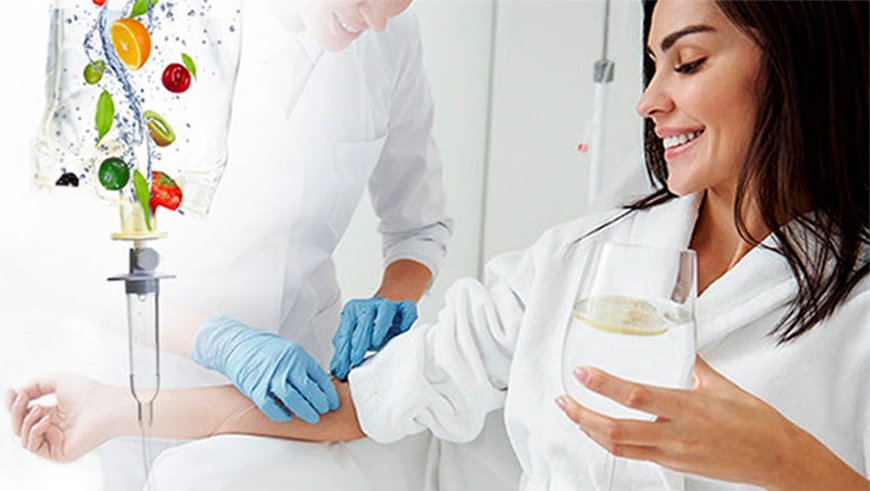Hydrogen Drip IV Therapy represents one of the most promising wellness treatments you might not have heard about yet. This lightweight, odourless, and colourless gas rapidly diffuses into your tissues and cells, functioning as an anti-inflammatory and anti-apoptotic agent while stimulating energy metabolism. Surprisingly, the first documented medical use of hydrogen dates back to British military doctors during the 1914-1918 war, who treated 26 terminally ill patients with remarkable results—13 of these patients survived against all odds.
Furthermore, your body can benefit from hydrogen in multiple ways beyond basic wellness. Specifically, hydrogen therapy for inflammation has shown impressive clinical outcomes, with studies demonstrating its effectiveness in reducing reperfusion damage in heart attacks, strokes, and acute ischemia. Additionally, hydrogen therapy for overall wellness works through multiple mechanisms, including increasing antioxidants and decreasing oxidative stress, cell death, and inflammation. What makes hydrogen therapy for cellular repair particularly valuable is that it reduces oxidative stress not only through direct reactions with strong oxidants but also indirectly by regulating various gene expressions. Throughout this article, you’ll discover how hydrogen infusion works in your body and why it might be the missing element in your wellness routine.
What is Hydrogen Infusion Therapy?
Molecular hydrogen, the smallest molecule in existence, has been quietly making waves in the wellness and medical communities as a powerful therapeutic agent. First discovered in 1520 by Philippus Aureolus Paracelsus as a mysterious flammable gas, hydrogen remained unnamed until 1783 when Lavoisier used the French word ‘hydrogene’ to describe it. Despite its long history, hydrogen’s therapeutic potential remained largely overlooked until recent decades.
Definition and origin of hydrogen therapy
Hydrogen Infusion Therapy involves the administration of molecular hydrogen (H₂) to the body through various methods to achieve therapeutic effects. Originally appearing in medical literature as early as 1888 in the Annals of Surgery, hydrogen was used by surgeons to locate visceral injuries in the gastrointestinal tract, avoiding unnecessary surgeries.
However, the true breakthrough came in 2007 when a landmark study published in Nature Medicine demonstrated hydrogen’s neuroprotective effects in cases of cerebral ischemia. This pivotal research sparked global interest in hydrogen’s therapeutic applications, with publications exploding from fewer than 50 pre-2007 to over 2000 in the past decade. In fact, this milestone publication is widely regarded as the spark that ignited modern hydrogen medicine.
Consequently, hydrogen therapy has gained significant momentum in clinical settings. By 2017, inhalation of hydrogen gas was approved as an advanced medicine by Japan’s Ministry of Health for treating post-cardiac arrest syndrome. Currently, over 100 human studies show hydrogen’s translational potential across various conditions, including metabolic syndrome, diabetes, Parkinson’s disease, and rheumatoid arthritis.
Hydrogen therapy can be administered through several methods:
- Inhalation of hydrogen gas
- Consumption of hydrogen-rich water
- Injection of hydrogen-rich saline
- Topical applications and baths
Why is hydrogen used in wellness treatments
What makes hydrogen particularly valuable in wellness treatments is its unique set of properties. As the smallest gas molecule with a molecular weight of only 2 Da and a kinetic diameter of 289 pm, hydrogen can easily penetrate cell membranes, cross the blood-brain barrier, and access critical cellular components like mitochondria and nuclei.
Essentially, hydrogen functions as a selective antioxidant, primarily targeting harmful free radicals like hydroxyl radicals (•OH) and peroxynitrite anions (ONOO-) while preserving beneficial reactive oxygen species needed for normal cell signalling. This selective action makes hydrogen superior to conventional antioxidants that indiscriminately neutralise all reactive species.
Notably, hydrogen offers multiple therapeutic mechanisms beyond antioxidation. It demonstrates potent anti-inflammatory effects by regulating pro-inflammatory cytokines like IL-1β, IL-6, and TNF-α. Additionally, hydrogen exhibits antiapoptotic properties, helping prevent programmed cell death.
Another advantage of hydrogen therapy is its exceptional safety profile. Unlike other gaseous signalling molecules such as nitric oxide or carbon monoxide, hydrogen has no known toxicity even at high concentrations. Its low solubility in water (1.9 mL H2/100 mL H2O at 20°C) means that concentrations remain well below the 4% needed to react with oxygen, making it completely safe within the human body.
Given these characteristics—powerful permeability, selective antioxidant effects, anti-inflammatory properties, and outstanding safety profile—hydrogen has rightfully earned recognition as the fourth signalling gas molecule after nitric oxide, carbon monoxide, and hydrogen sulfide.
How Hydrogen Works in the Body
The remarkable biological effects of hydrogen stem from its unique physical and chemical properties. At just 2 Da in molecular weight, hydrogen stands as the smallest molecule in existence, enabling it to penetrate biological membranes and reach critical cellular compartments where other molecules simply cannot go.
Cellular absorption and diffusion
Once administered, hydrogen rapidly traverses throughout your body thanks to its exceptional permeability. Unlike larger antioxidant compounds, hydrogen effortlessly passes through cell membranes and diffuses into subcellular compartments, including mitochondria and nuclei. First of all, this remarkable diffusion capacity allows hydrogen to reach the primary sites of reactive oxygen species (ROS) generation, where it can exert its protective effects most efficiently.
Indeed, hydrogen’s extraordinary ability to penetrate biological barriers enables it to access areas typically off-limits to conventional therapeutic agents. It easily crosses the blood-brain barrier, placental barrier, and testis barrier without requiring special transport mechanisms. Moreover, when hydrogen-rich water is consumed, absorption begins in the stomach and continues in the small intestine, where millions of tiny finger-like structures called villi enhance absorption.
Selective antioxidant properties
What truly sets hydrogen apart is its selective antioxidant activity. Instead of indiscriminately neutralising all reactive oxygen species, hydrogen selectively targets the most damaging ones—hydroxyl radicals (•OH) and peroxynitrite (ONOO−)—while preserving beneficial ROS needed for normal cellular signalling.
This selective action occurs through direct chemical reactions. For instance, hydrogen neutralises hydroxyl radicals through the reaction: H₂ + 2•OH → 2H₂O. Additionally, hydrogen leaves physiologically beneficial ROS like hydrogen peroxide (H₂O₂) and superoxide anion (O₂⁻) untouched, allowing them to continue their essential roles in cell signalling.
Consequently, hydrogen enhances your body’s antioxidant capacity beyond direct scavenging. It stimulates endogenous antioxidant enzymes, including superoxide dismutase (SOD), catalase, and myeloperoxidase. Given these properties, hydrogen therapy for cellular repair works at multiple levels within your antioxidant defence system.
Impact on inflammation and oxidative stress
Hydrogen’s effects on inflammation and oxidative stress are closely intertwined. In the face of oxidative stress, hydrogen inhibits the NF-κB pathway—a major regulator of inflammatory responses. Subsequently, this leads to reduced production of pro-inflammatory cytokines such as IL-1β, IL-6, and TNF-α.
At the cellular level, hydrogen prevents mitochondrial damage by decreasing NADPH oxidase expression, thereby reducing ROS accumulation. Furthermore, hydrogen therapy for inflammation works by inhibiting inflammatory cell adhesion molecules like ICAM-1 and reducing infiltration of neutrophils and macrophages at inflammatory sites.
Another powerful mechanism involves hydrogen’s impact on lipid peroxidation. By protecting cell membrane phospholipids from oxidation, hydrogen maintains membrane integrity and prevents cellular damage that would otherwise trigger inflammatory cascades.
Hormetic effects and gene regulation
Perhaps most fascinating is hydrogen’s ability to influence gene expression and promote hormesis—a biological phenomenon where low-dose stressors trigger beneficial adaptive responses. Mild oxidative stress induced by hydrogen peroxide can stimulate organisms’ biological functions and increase resistance to higher doses of the same stressor.
Through these hormetic effects, hydrogen regulates numerous signalling pathways and transcription factors. For instance, hydrogen activates the Nrf2 pathway, a master regulator of antioxidant responses. As Nrf2 accumulates, it binds to antioxidant response elements and initiates protective gene expression.
Likewise, hydrogen affects apoptosis-related genes, reducing expression of pro-apoptotic factors like p53 while enhancing anti-apoptotic genes such as Bcl-2. Beyond these effects, hydrogen modulates calcium signalling pathways, affecting transcription factors like CREB and NFAT that regulate numerous genes.
To sum up, hydrogen’s biological effects emerge from its unique physical properties, selective antioxidant activity, anti-inflammatory actions, and gene-regulating capabilities—creating a comprehensive therapeutic profile unlike any other molecule.
Methods of Hydrogen Administration
Accessing the therapeutic benefits of hydrogen requires getting this tiny molecule into your body, with several proven methods available depending on your wellness goals and preferences.
Hydrogen inhalation therapy
Inhalation represents one of the most direct and rapid methods for delivering hydrogen to your bloodstream and tissues. According to research, you can inhale either pure hydrogen gas or a mixture of hydrogen and oxygen (commonly referred to as oxy-hydrogen). Most clinical applications utilise a concentration of 2-4% hydrogen gas for safety and efficacy. Some advanced hydrogen-oxygen generators produce a mixture containing 66.7% hydrogen and 33.3% oxygen at a flow rate of 3 L/min[41]. This method works exceptionally well for acute conditions due to its immediate effects on the respiratory and cardiovascular systems.
Hydrogen IV therapy and drips
Saturated Hydrogen Water Intravenous Therapy delivers highly-concentrated hydrogen directly into your bloodstream through normal saline. The hydrogen concentration in these infusions typically exceeds 1.6ppm—the maximum concentration achievable under normal temperature and pressure. Throughout an IV session lasting 30-60 minutes, hydrogen molecules enter endothelial cells in your blood vessels, reacting with harmful active oxygen to form water that’s naturally eliminated through urine. Preparation methods include immersing polyethene bags in hydrogen-rich water tanks or using special non-woven fabric containing hydrogen-generating agents. This method provides precise control over hydrogen dosage.
Drinking hydrogen-rich water
Drinking hydrogen-enriched water offers a convenient, portable option for daily hydrogen consumption[53]. You can obtain hydrogen water through infusion machines, water generators, ionisers, or hydrogen-generating tablets. Some commercial products claim to achieve concentrations over 7ppm in 500mL bottles and even 15ppm in 250mL formats. Another innovative approach involves capsules containing porous coral material that absorb and carry hydrogen, releasing it inside your body after consumption. Although limited by hydrogen’s low water solubility of 1.57mg/L, this method remains popular for its simplicity.
Topical and bath-based applications
Bathing in hydrogen-rich water ranks among the most effective therapies for promoting antioxidant activity in your blood compared to other antioxidant administration routes. Specialised devices like the Hebe Hydrogenium+ create hydrogen-rich water for non-invasive skin application. The treatment process typically involves using specialised handpieces that deliver hydrogen-rich water to your skin—either through gentle vacuum lifting or pressurised jets. These treatments often follow a systematic protocol including cleansing, application, and moisturising phases. Besides full baths, topical applications may include hydrogen-rich wet compresses for localised treatment.
Health Benefits of Hydrogen Infusion
Research reveals that molecular hydrogen offers multiple therapeutic benefits through its unique selective antioxidant and anti-inflammatory properties. Let’s explore the specific ways hydrogen infusion can enhance your well-being.
Hydrogen therapy for fatigue and energy
Hydrogen supplementation has demonstrated promising results in combating fatigue and boosting energy levels. Studies show hydrogen-rich water significantly reduces the rating of perceived exertion during exercise and decreases blood lactate concentrations both during and immediately after physical activity. Clinical evidence indicates hydrogen water may be particularly beneficial for those experiencing exercise-induced fatigue, as it helps neutralise excess reactive oxygen species that contribute to diminished performance.
Hydrogen therapy for inflammation and joint pain
For those suffering from joint pain, hydrogen therapy offers substantial relief. Research indicates that hydrogen can inhibit inflammatory factors like ADAMTS5 and MMP13 in osteoarthritis patients. Importantly, clinical trials have shown that hydrogen-oxygen mixture inhalation helps alleviate symptoms and improve functional activity in elderly patients with knee osteoarthritis. This improvement comes from hydrogen’s ability to suppress inflammatory pathways—primarily by inhibiting the JNK signalling pathway.
Hydrogen therapy for skin health and glow
Your skin can benefit tremendously from hydrogen therapy. Clinical studies show hydrogen-rich water treatments effectively reduce pore visibility and improve pigmentation irregularities. Furthermore, hydrogen works to neutralise free radicals responsible for premature ageing, fine lines, and skin dullness. It also helps maintain collagen integrity by preventing oxidative degradation of skin structural proteins.
Hydrogen therapy for muscle recovery & sports injury
Athletes have discovered hydrogen’s remarkable effects on recovery. Four days of hydrogen-rich water supplementation have been shown to reduce blood creatine kinase activity (156 ± 63 vs. 190 ± 64 U.L−1) and muscle soreness (34 ± 12 vs. 42 ± 12 mm) after intense training. Plus, athletes experienced improved countermovement jump height (30.7 ± 5.5 cm vs. 29.8 ± 5.8 cm), suggesting faster functional recovery.
Hydrogen IV therapy for brain & cognitive health
Hydrogen readily crosses the blood-brain barrier, making it especially valuable for cognitive health. Research suggests hydrogen therapy may help manage Alzheimer’s disease by addressing oxidative stress—a central factor in neurodegenerative disorders. Studies with senescence-accelerated mice demonstrated that hydrogen water prevented age-related declines in cognitive ability and was associated with increased brain serotonin levels.
Hydrogen therapy for mobility & flexibility
Finally, hydrogen therapy supports improved mobility by reducing inflammation in joints and enhancing tissue repair. Clinical research shows that hydrogen effectively mitigates osteoarthritis-induced cartilage damage and promotes cartilage regeneration. This makes hydrogen infusion particularly valuable for addressing mobility challenges stemming from inflammatory joint conditions.
Clinical Evidence and Safety
Over the past two decades, extensive research has accumulated with more than 2000 publications documenting hydrogen’s therapeutic potential. Clinical trials span major disease categories, including cardiovascular, respiratory, and central nervous system disorders.
Summary of human and animal studies
Scientific investigations reveal hydrogen’s therapeutic applications across multiple conditions. Animal studies demonstrate hydrogen’s efficacy in reducing oxidative stress-related diseases and preventing neurodegeneration. Randomised clinical trials show hydrogen improves cognitive scores in APOE4 carriers with mild cognitive impairment, while double-blind studies indicate significant improvement in Parkinson’s disease symptoms. Throughout Japan, hydrogen inhalation received approval for post-cardiac arrest syndrome treatment in 2016.
Hydrogen IV therapy benefits in chronic conditions
Patients with chronic conditions often experience substantial improvements from Hydrogen IV therapy. For chronic kidney disease sufferers, hydrogen supplementation shows decreased serum creatinine levels. Additionally, hydrogen therapy modulates immune responses by increasing regulatory T cells while reducing inflammatory cells. Even more promising, hydrogen administration helps manage inflammatory bowel disease by regulating NF-κB and PI3K/AKT/mTOR signalling pathways.
Safety profile and FDA status
Hydrogen therapy exhibits an excellent safety record with minimal adverse effects reported across clinical trials. The US FDA issued a notice (GRAS Notice No. 520) acknowledging hydrogen solubilised in water (up to 2.14% concentration) as generally recognised as safe for beverages. Nonetheless, hydrogen inhalation requires specialised equipment for production, making proper administration important for safety.
Who should avoid hydrogen therapy?
Given that unregistered hydrogen devices lack quality and safety assurances, only use products with proper certification. Currently, hydrogen therapy remains experimental for musculoskeletal conditions and should be approached cautiously. Before beginning hydrogen therapy, consult your healthcare provider, especially if pregnant or managing serious medical conditions.
Conclusion
Hydrogen infusion therapy stands at the forefront of innovative wellness treatments, offering remarkable potential for your overall health. Throughout this article, we’ve seen how this lightweight molecule penetrates cellular barriers and selectively targets harmful free radicals while preserving beneficial ones. Additionally, hydrogen’s anti-inflammatory properties make it particularly valuable for addressing chronic conditions and supporting recovery.
Whether you choose inhalation therapy, IV drips, hydrogen-rich water, or topical applications, each method provides unique advantages depending on your specific wellness goals. Consequently, hydrogen therapy offers multiple pathways to experience benefits ranging from reduced fatigue and enhanced energy to improved skin health and cognitive function.
Clinical evidence continues to mount in support of hydrogen’s therapeutic applications. Research demonstrates its effectiveness across various conditions while maintaining an excellent safety profile. Still, consulting with healthcare professionals before starting any new therapy remains essential, especially if you have underlying health concerns.
Hydrogen infusion therapy represents much more than a passing wellness trend. The science behind its effectiveness reveals a profound impact on cellular health through multiple mechanisms. As research advances and awareness grows, hydrogen therapy will likely become an increasingly important component of comprehensive wellness strategies. Your journey toward optimal health might benefit significantly from this remarkable element that works harmoniously with your body’s natural processes.
Key Takeaways
Hydrogen infusion therapy offers a scientifically backed approach to wellness through the body’s smallest molecule, providing selective antioxidant effects and anti-inflammatory benefits with exceptional safety.
• Hydrogen selectively targets harmful free radicals while preserving beneficial ones, unlike conventional antioxidants that neutralise all reactive species indiscriminately.
• Multiple administration methods exist, including inhalation, IV therapy, hydrogen-rich water, and topical applications, each offering unique advantages for different wellness goals.
• Clinical studies demonstrate hydrogen’s effectiveness for reducing fatigue, inflammation, joint pain, and supporting muscle recovery with minimal side effects.
• Hydrogen easily crosses biological barriers, including the blood-brain barrier, making it valuable for cognitive health and neurological conditions.
• With over 2000 publications and FDA recognition as generally safe, hydrogen therapy represents a promising addition to comprehensive wellness strategies.
The therapeutic potential of hydrogen lies in its unique ability to work at the cellular level while maintaining an outstanding safety profile, making it accessible for various health optimisation goals from athletic recovery to chronic condition management.
FAQs
Q1. What are the main benefits of hydrogen therapy for the human body?
A1. Hydrogen therapy offers several health benefits, including reduced oxidative stress, improved cardiovascular function, enhanced liver health, and potential neuroprotective effects. It acts as a selective antioxidant, targeting harmful free radicals while preserving beneficial ones.
Q2. Are there any known side effects of hydrogen infusion therapy?
A2. Hydrogen infusion therapy has an excellent safety profile with minimal reported side effects. Clinical trials have not observed common adverse reactions such as nosebleeds, chest pain, breathing difficulties, nausea, dizziness, or skin allergies associated with hydrogen-oxygen inhalation.
Q3. How does hydrogen therapy work to reduce inflammation in the body?
A3. Hydrogen therapy helps reduce inflammation by modulating the body’s immune response. It dampens pro-inflammatory cytokines while boosting anti-inflammatory compounds, effectively regulating inflammatory pathways and providing relief from various inflammatory conditions.
Q4. What is the recommended daily intake of hydrogen-infused water?
A4. Most studies suggest consuming about 1.5 to 2 litres (50 to 60 ounces) of hydrogen-infused water daily for optimal benefits. This can be achieved through hydrogen tablets or by drinking hydrogenated water. However, it’s always best to consult with a healthcare professional for personalised advice.
Q5. Can hydrogen therapy improve cognitive function and brain health?
A5. Yes, hydrogen therapy shows promise for cognitive health. It readily crosses the blood-brain barrier, potentially helping manage neurodegenerative conditions like Alzheimer’s disease by addressing oxidative stress. Some studies have shown improvements in cognitive scores and symptoms of neurological disorders with hydrogen therapy.














